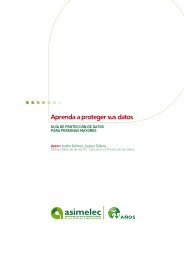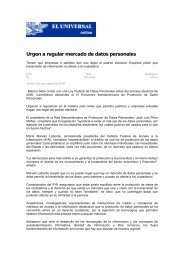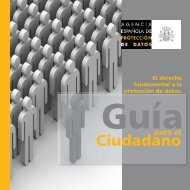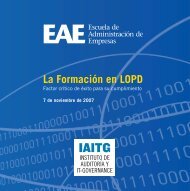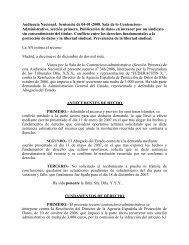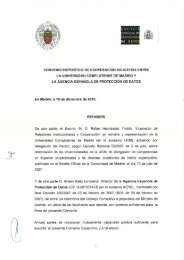access to public information and personal data protection 1 table of ...
access to public information and personal data protection 1 table of ...
access to public information and personal data protection 1 table of ...
Create successful ePaper yourself
Turn your PDF publications into a flip-book with our unique Google optimized e-Paper software.
ACCESS TO PUBLIC INFORMATIONAND PERSONAL DATA PROTECTIONHuixquilucan (Mexico State), 4 th November 2005Likewise, the exercise <strong>of</strong> the right <strong>to</strong> <strong>personal</strong> <strong>data</strong> <strong>protection</strong> has its limits,although such limits must meet the following criteria: a) they are permissible <strong>to</strong>the extent that there is a prevailing <strong>public</strong> interest; b) there is an express,precise, legal instrument that meets the requirements <strong>of</strong> the principle <strong>of</strong>proportionality; c) the doubt in question should be interpreted in a limited manner,as it is a matter <strong>of</strong> “guaranteeing <strong>and</strong> protecting <strong>public</strong> freedoms <strong>and</strong> thefundamental rights <strong>of</strong> individuals with respect <strong>to</strong> <strong>personal</strong> <strong>data</strong> processing, <strong>and</strong> inparticular, their honour <strong>and</strong> <strong>personal</strong> <strong>and</strong> family privacy”, <strong>and</strong> d) theconsideration <strong>of</strong> whether such limits not only violate the principles <strong>of</strong> consent <strong>and</strong>purpose established by <strong>personal</strong> <strong>data</strong> <strong>protection</strong> laws, but also the principle <strong>of</strong>quality, which provides that only the <strong>data</strong> that is absolutely necessary should bemade available <strong>to</strong> attain the aforesaid purpose.It may be said that there is no true a priori conflict between the right <strong>to</strong><strong>information</strong> <strong>and</strong> the right <strong>to</strong> <strong>personal</strong> <strong>data</strong> <strong>protection</strong>, <strong>and</strong> therefore, no priorlegal-philosophical scenario need occupy our attention. It is rather a question <strong>of</strong>seeing that the relevant authorities, or those with jurisdictional or quasijurisdictionalpowers, resolve the issues amicably as they arise, ad casum.Furthermore, democratic societies must safeguard the <strong>protection</strong> <strong>of</strong> <strong>personal</strong><strong>data</strong>. The most fully developed regime for such <strong>protection</strong> is envisaged in theEuropean models, which are based primarily on Convention 108 <strong>of</strong> the EuropeanCouncil on the <strong>protection</strong> <strong>of</strong> individuals with regards <strong>to</strong> processing <strong>of</strong> <strong>personal</strong><strong>data</strong> issued in 1981, <strong>and</strong> Directive 95/46/EC <strong>of</strong> the European Parliament <strong>and</strong>Council on the Protection <strong>of</strong> Personal Data.The aforementioned legislation also establishes the rights <strong>to</strong> <strong>access</strong>, correction,cancellation <strong>and</strong> opposition as fundamental rights <strong>of</strong> all <strong>data</strong> subjects.Thus, the present study is addressed at setting out the principles that govern<strong>access</strong> <strong>to</strong> <strong>public</strong> <strong>information</strong> on the one h<strong>and</strong>, <strong>and</strong> those regulating <strong>personal</strong> <strong>data</strong><strong>protection</strong> on the other; the possible exceptions <strong>to</strong> those principles, <strong>and</strong> certaincases <strong>of</strong> conflicts <strong>of</strong> rights that may arise due <strong>to</strong> the diversity <strong>of</strong> the principles thatapply <strong>to</strong> both issues.3



